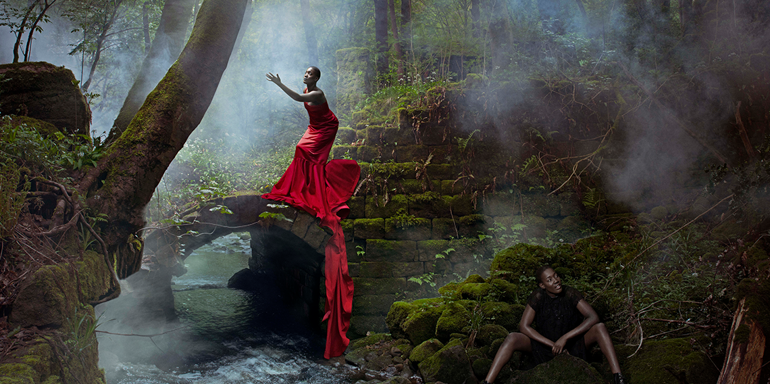Professor Robert Bentall is a composer, performer and researcher working within the electroacoustic music domain. His works, which have been heard across Europe as well as North and South America, hybridise ambient, folk, dance, improvised and experimental music.
Recently, Robert has been commissioned to write the score to the new adaptation of Shakespeare's 'As You Like It' by Northern Broadsides Theatre, which will have a national tour next year.
We spoke to Robert about this wonderful opportunity, career to date and their love of electroacoustic music and composition.
Hello Rob - Where did your career journey into electroacoustic music and composition begin?
I started composing in sixth form. One of the local state comprehensive schools in Enfield, where I grew up, offered the International Baccalaureate (IB) instead of A-Levels. I felt very lucky to be able to access that course, as it did a world of good for me. The IB music course was very creative in nature, and catered well for my somewhat unusual traits as a young musician. I played the electric guitar and double bass, and was able to record my own musical ideas, but couldn't really read music at that point.

I first discovered electroacoustic music at University. I was immediately attracted to it. I really enjoyed working with creative processing software such as the GRM Tools, which I now teach with at Leeds Conservatoire. I loved how I could repeatedly audition and alter my own composition as I went along. The whole process of making electroacoustic felt quite like 'sculpting' sound, as if it was wet clay, rather than organising notes on a page.
I also loved it as, while a music student myself, I always felt a little lost at sea with instrumental composition because I couldn't play the piano and couldn't hear music in my head. Electroacoustic music didn't require this; instead, the act of composing is much more led by the sound materials themselves; the process of structuring works is more organic.
What have been some of the highlights of your career so far?
In 2016, I travelled to Mexico to play my piece Telian, in its first version for 8-channel surround sound fixed electronics, at the Visiones Sonoras Festival. The atmosphere was fantastic, and I was so grateful to be supported in this endeavour by national new music organisation, Sound and Music.
In 2018, I collaborated with Knaïve Theatre on a production of War With The News, a sci-fi satire by relatively unknown Czech author Karel Čapek. We took the show to Edinburgh's Summerhall as part of the Fringe Festival. We were given the venue's Lustrum Award for innovative theatre for this show, which we were very proud of.
In 2019, I travelled to Jakarta, Indonesia with Impermanence, a Bristol-based company with which I have enjoyed several fruitful collaborations. We went out there to perform our work Baal, an adaptation of Bertolt Brecht's first play, for dancers, visuals, electronic soundtrack, and live musical performance from me on the nyckelharpa.
Very recently, I have been conferred with an Associate Professorship in Sound Design, Composition and Performance at Leeds Conservatoire, which feels amazing. I'm looking forward to developing some new strands of thought at college that derive from my creative practice.
What has been the most important thing you've learned throughout your career?

Know that there will always be something in a piece you've written that you think you can improve, even when it's finished. It's important to finish things and move on - perfectionism is generally not helpful for making progress as a composer, in my view.
Also, that composing and cooking are similar processes for me. I really love cooking and find that I have some of my best ideas for pieces when I'm in the kitchen.
You have been commissioned to write the score to the new adaptation of Shakespeare's 'As You Like It' by Northern Broadsides Theatre, which will have a national tour next year. Can you tell us a little bit about your plans for the score?
I'm planning to develop a soundtrack that combines very ancient instruments as well as modern, electronica-tinged soundworlds. Quite a lot of my creative work does this. It will include sections of ambient drone music that are derived from the nyckelharpa, the 16-stringed Swedish fiddle I play that forms an important part of my practice, and also parts where there will be a blend of synthesised sounds.
In creative conversations with the Northern Broadsides team, we have discussed how the work might start off sounding like a rowdy, WWE-esque wrestling match. Then, the score becomes more ambient and surreal when the play's characters enter the forest. I'm also really inspired by the soundtrack to Succession right now, and I think some of the faux-classical dramatic music in the show will filter in to my process in the writing of this score.
Why do you think regional theatre companies such as Northern Broadsides are so crucial to Northern England's theatre scene?

Image: Northern Broadsides
Northern Broadsides is really important - they reinvent classic theatrical works with northern voices and for modern, diverse audiences. They engage people in theatre that might not otherwise have any interaction with it and help represent northern communities through important works by writers such as Shakespeare.
The North of England has a really wonderful theatre scene with lots of companies of various sizes producing fantastic work. For example, I recently worked with Mafwa Theatre, a community theatre company working with refugees and asylum seekers, on a score for one of their productions titled "The Journey", directed by Mahshid Alavizadeh, as part of their ACE-funded "Flock" project.
What is your favourite thing about being Associate Professor in Sound Design, Composition and Performance at Leeds Conservatoire?
I really love seeing students react so positively to some of the music, sounds and creative tools in the way I did when I was a student. I will never forget what a "lightbulb" moment studying a module in electroacoustic music at the University of Manchester was for me, and I love seeing the same thing happen to some of them. I also really enjoy seeing their creative voices develop across an academic year, and hearing how their creative approaches start to manifest themselves in their music in a distinctive, individual way.
I also really enjoy talking to the students about what makes them tick outside of music. Some of those things end up in their compositions.
What advice would you give to young people wanting to form a career in the Music Industry, particularly those interested in composition?
Think really hard about what you want to hear in your own music. Make sure it's a good representation of you and all the things you love. Take all of your influences, and stir them up in a big pot, as if you were cooking up something great, and that's a good place to start.






